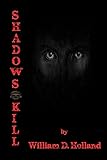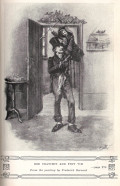- HubPages»
- Books, Literature, and Writing»
- Commercial & Creative Writing»
- Creative Writing
Selling Short Stories and Novellas As eBooks
Some Initial Thoughts
I’m a little too young to remember pulp fiction magazines and believe me, that is one of the few times this old man can say that he’s “too young.” World War 2 and the increased demand for paper, as well as a changing literature landscape, meant the death of pulp fiction. From 1949 to 1959 all of the major publishers of pulp fiction closed their doors and their products rapidly became collector’s items.
What is pulp fiction?
Pulp fiction was popular during the last half of the 19th Century and first half of the 20th. The name is derived from the use of “cheap”paper, or pulp paper, for publication, as opposed to sleek paper used by the more established magazines. It was, in many way, the successor of the dime novels which were so popular in the mid-and-late 19th Century.
Some pulp fiction stories were printed weekly; some monthly; most sold for ten cents and during the peak of their popularity the more successful pulps would sell upwards of a million copies in the United States alone. You may have heard of some, The Shadow, Doc Savage, and The Phantom Detective, all famous in their time and still titles known to serious literary collectors.
Lest you think these were written by the scrubs of the literary world, know that some rather famous names started out by writing pulps. Edgar Rice Burroughs, Robert E. Howard, Talbot Mundy, Abraham Merritt, John D. MacDonald, all began their careers by churning out pulp fiction.

So That Got Me to Thinking
I’m not a huge fan of eBooks but there is no denying they are here to stay, and since I’m in no hurry to commit literary suicide, I am interested in them as a vehicle for my own writings. While reading an old pulp fiction a couple months ago, I asked myself if modern-day pulp fiction could be published as eBooks? Would there be a market for short fiction in the pulp fiction style?
Thus was born a series of short stories I’ve written of late about a fictional character named Billy the Kid. Billy is what I consider an anti-hero to be. He may not have the greatest moral compass and yet he is not a real bad guy. He does what he needs to do to survive and more often than not his heart is in the right place. He saves damsels in distress and stands up for the little guy, and often his delivery of justice is violent and not for the squeamish. Quite frankly I love writing about him, and his short stories have been well-received by my followers.
So why not a series of eBooks about Billy?
Why not indeed?
The Billy the Kid Chronicles is born. The first one has been published and can be found to the right of this text, and I’ll try to publish one each month from then on until Billy tells me he’s tired of the literary game. The short stories I’ve written so far have been practice. They have been a way for me to gauge my readers’ reactions and gauge the amount of interest. I’ll have to expand them greatly and I’m sure, during the process, some things will be changed.
And I love that challenge!

My Book on Writing
How Does a Person Price a Pulp Fiction/ebook?
Let’s get down to the nitty-gritty, shall we? What would people pay for a modern-day pulp fiction?
In many ways, the eBook industry is still virgin territory. There are few rules and few guidelines to follow. We are told by Amazon that full-length novels, eBook style, sell best when priced at $5.99 and above. Short stories, however, sell best at $.99. So what do we do with a pulp fiction that hovers around the 25,000 word length?
One thing worth considering is the price point and writer royalties. Books priced from $2.99 up will give an author a royalty of 70% of the list price. Books priced below $2.99 will only give a 35% royalty. Something to think about, yes?
Can you really price a 25,000 word pulp fiction for $2.99 when full-length novels of 100,000 words sell for $5.99? Seems like a horrible value when seen that way, so one is really stuck with the 35% royalty for a short story or pulp fiction.
My first inclination is to sell the Billy the Kid Chronicles for $.99 each, meaning I’ll make about thirty cents for every sale. I could go $1.99 but even that, to me, seems too high a price. As of the writing of this article I’m still debating. Update: I priced it at ninety-nine cents for the eBook. In my opinion that’s one hell of a bargain.
The first in my thriller series
What About Createspace?
Here’s where we run into problems with this concept. If I choose to also self-publish a paperback version of the “pulp fiction,” I have pricing problems with CreateSpace. The lowest they will let me go on a small book is $5.38. Tack on shipping and I would be asking people to pay over eight bucks for a 25,000 word book/short story and that is definitely too high.
Still, I’ll want copies of any book I write, and it is free to publish with CreateSpace, so my solution is to go ahead and do that, price it at the ridiculous price of $5.38, and then encourage my friends not to buy it. LoL….how’s that for a sales pitch?
Herein lies the major problem with novellas in the publishing industry. The cost of publishing a novella is prohibitive on the best of days, so keep that in mind should you go down this particular path.

Other Options
Of course there are other options. One can self-publish on Lulu as well as Smashwords and several other self-publishing sites, and I invite you to take a look at them. For me, though, I’ve always self-published on CreateSpace/Amazon, and I am familiar and comfortable with them, so for me convenience wins out over learning new formatting on a different site.
The Second in My Thriller Series
Will My Plan Work?
I have absolutely no idea. I don’t know how well novellas sell as ebooks. I have no idea how this particular series will be received. I have no idea if it is a complete waste of time.
And I’ll continue to have no idea about any of those things if I don’t try.
So there you go!
And that’s my message to all of you who are hesitating to try something you’ve never tried before.
We will never know if we don’t try!
While I was writing this article, a friend mentioned that Ian Fleming also wrote pulp fiction in his early years. Yes, the creator of James Bond, one of the most successful and widely-read series in history, began as a pulp fiction writer. He had a dream, but he also had enough desire to work hard at his craft, and keep writing until his break came.
And boy oh boy, did it ever come.
So Move over Ian Fleming
James Bond, move aside….Billy the Kid is walking into the building, and he means business. I chuckle as I write that. As a young man I probably had the hubris to believe those words. Today I have a clear understanding of what it takes to succeed, and a firm grasp of the realities of the writing and publishing business.
Wish me luck. I suspect I’ll need it.
2016 William D. Holland (aka billybuc)
“Helping writers to spread their wings and fly.”












